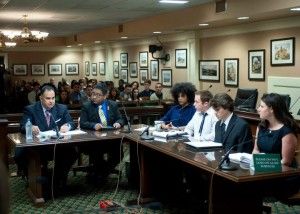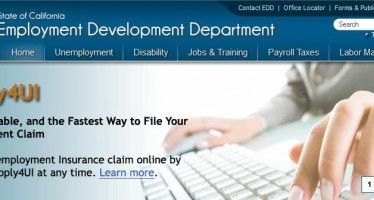Robbing business to pay for education
August 14, 2012
By Katy Grimes
SACRAMENTO — Even in California, there are lawmakers who recognize that the “Middle Class Scholarship” bill is just one more attempt to tax businesses to help expand California’s growing education welfare system. AB 1500, by Assembly Speaker John Perez, finally passed the Assembly Monday, with the help of one Republican, and a former Republican.
After five previous tries, AB 1500 passed 54-24, with just barely the two-thirds vote required for bills which increase taxes. All Democrats voted for the bill, but so did Republican Assemblyman Brian Nestande of Palm Desert and former Republican, now a registered Independent, Assemblyman Nathan Fletcher of San Diego.
Fletcher, who in June lost a primary race for mayor, spoke in favor of Perez’s bill Monday during floor debate. He accused Republicans of having a “great misunderstanding” of the bill, and assured everyone that passage of AB 1500 would help California businesses and the middle class. “It’s an opportunity to get more California students into CSU and UC schools,” Fletcher said.
“I’m putting forth my effort, my vote, to say we need to come together and work on some of these issues to bring businesses back to California and to grow the economy,” said Nestande.
AB 1500
Perez introduced AB 1500 as a companion bill to AB 1501, also by Perez, which would authorize the spending of the $1.2 billion dollars raised by the tax to assist college and university students from families earing less than $150,000 per year.
However, the bill is light on details about this scholarship fund.
“The money saved by closing this loophole, approximately one billion dollars annually, will be used to fund the Middle Class Scholarship, which will cut student fees by two-thirds for UC and CSU students whose families earn less than $150,000 per year and includes $150 million to increase affordability at the state’s community colleges,” Perez’s website states.
At previous hearings, Perez trotted out hundreds of college students to share the hardships they suffer under California’s college system. Most of the students’ complaints were about having to work while going to college.
“But even more insidious than this attempt to increase taxes, this bill is just another banal repackaging of similar bills that have failed to pass the smell test with voters, and even legislators,” I wrote in May about AB 1500. “However, this version is worse because it contains none of the tax credits or other incentives from the 2011 bills, the last attempt to repeal a business tax credit.”
AB 1500 would raise taxes on businesses and employers who operate inside California, but are headquartered out-of-state. Unlike the previous versions of the legislation, this latest bill remodeling added in claims that the proceeds will go to creating a “Middle-Class Scholarship” for California’s public college students, in an attempt to make the bill more palatable.
Perez calls this tax credit a “loophole.”
“AB 1500 restores the level playing field for California businesses,” Perez has said at each of the hearings on AB 1500.
The loophole is not a loophole
In 2009, state law was agreed to and changed by both Democrats and Republicans to allow the use of the single sales apportionment factor to be used by businesses. The corporate tax break, imperative for stimulating business in the state, allows businesses to choose whether to have their income tax based on the proportion of their total sales within California — or on a combination of their total sales and operations, which includes payrolls as well as property.
Perez calls this a “loophole” even though it was a bipartisan decision.
Another tax on business
With California bleeding out businesses to other states, as well as record business closures, imposing another tax of any kind, for any reason on business and employers, demonstrates the callous disregard for the backbone of the state’s economy. And it is only made worse with Perez’s promise to take the anticipated $1.2 billion raised, and expand the state public education system even more.
Complaints from students center more on the lack of availability of classes they need, than even the increasing fees.
AB 1500 is a very large tax increase on manufacturers, retailers and other employers that create jobs for California workers. Many fear that it will only lead to more uncertainty and unpredictability within businesses, and discourage companies from growing, or investing in California.
“Current law allows companies two ways to pay their fair share of taxes. AB 1500 removes one of those options,” the Legislative Analyst’s Office reported. But Perez has a different take on this tax law: “This elective method right now creates a ‘perverse disincentive’ to invest in new plants and jobs in the state. It actually creates an incentive to move payroll and property out of state.”
The California Manufacturers and Technology Association opposes AB 1500 and calls the funding scheme “an unjustified $1 billion tax increase on companies that create jobs, pay taxes on their property, sales and payroll receipts, and have employees in California.”
The irony of this bill is that it will likely lead to fewer middle-class jobs for those middle-class students when they graduate college. A $1.2 billion tax increase on California employers already struggling to compete against businesses in other states, will have fewer employment opportunities for the middle class, leaving California to continue educating its young people so they can get jobs in other states.
AB 1500 will now go to the Senate.
Related Articles
CA taxes, mandates boost unemployment
“California raised a bunch of taxes this year. Its economy hasn’t collapsed.” So read the snarky headline accompanying a
Brown debuts big budget revision
Gov. Jerry Brown has unveiled the highly-anticipated revision to his annual state budget, teeing up final spending negotiations in Sacramento
Dour governor pitches deep cuts
MAY 14, 2010 By STEVEN GREENHUT At a press conference at 1 pm today, Gov. Arnold Schwarzenegger released a May





